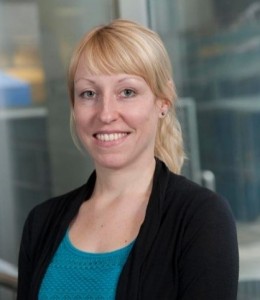Speaker: Dr. Katja Haedicke, iThera Medical GmbH
10.30 – 11.40
407, TPOC-3
ABSTRACT: This talk will introduce the evolving technology of Raster-Scanning Optoacoustic Mesoscopy (RSOM). By using a nanosecond-pulsed laser with the wavelength of 532 nm, intrinsic tissue chromophores like hemoglobin or melanin are getting excited and generate ultrasound waves within the tissue due to short thermoelastic expansion. This process can deliver non-invasive, high-resolution images of skin and tumor vascularization, depict vessels in organs and can furthermore be used to study the optoacoustic properties of nanoparticles or dyes in phantoms. The use of ultra-wide bandwidth detectors enables the detection of different ultrasound bandwidths and thus the separation of smaller and bigger structures based on the emitted ultrasound frequencies. Using RSOM, single vessels can be followed over time in a non-invasive manner up to a few millimeters in depth and novel materials for nanoparticles can be studied.
SPEAKER INTRODUCTION: Dr. Katja Haedicke received her Master of Science in the field of Microbiology in 2010 at the Friedrich-Schiller-University in Jena, Germany. She then moved into the field of preclinical cancer research and studied the therapeutic efficacy of photodynamic therapy in the group of Experimental Radiology at the University Hospital Jena using near-infrared fluorescence optical imaging. In 2015, she started to work as a Post-Doc at Memorial Sloan Kettering Cancer Center in New York in the lab of Dr. Jan Grimm. Her work focused on the use of raster-scanning optoacoustic mesoscopy (RSOM) to investigate novel vascular-targeted tumor therapies. She worked in close collaboration with the groups of Prof. Dr. Vasilis Ntziachristos in Munich and Prof. Dr. Avigdor Scherz from the Weizmann Institute in Israel. Since April this year she is working for iThera Medical GmbH in Munich, Germany as an Application Specialist for preclinical and clinical optoacoustic imaging modalities.